After a brain injury, your recovery journey can be significantly influenced by the food you eat. A healthy diet plays a crucial role in boosting your recovery process and supporting overall health. By incorporating the right foods into your diet, you can enhance gut health, reduce inflammation, and promote digestion.
Understanding the connection between your diet and brain health is vital for making informed decisions about your recovery. Certain foods can support or hinder your progress, making it essential to know which ones to include in your meal plan.
Key Takeaways
- Discover 9 powerful foods that enhance gut health and support brain recovery.
- Learn how specific nutrients benefit brain health and support the recovery process.
- Understand the importance of the gut-brain axis in your recovery journey.
- Gain practical knowledge on incorporating healing foods into your daily diet.
- Create a brain-healing meal plan that supports your overall health and wellbeing.
The Critical Connection Between Brain Injury Recovery and Nutrition
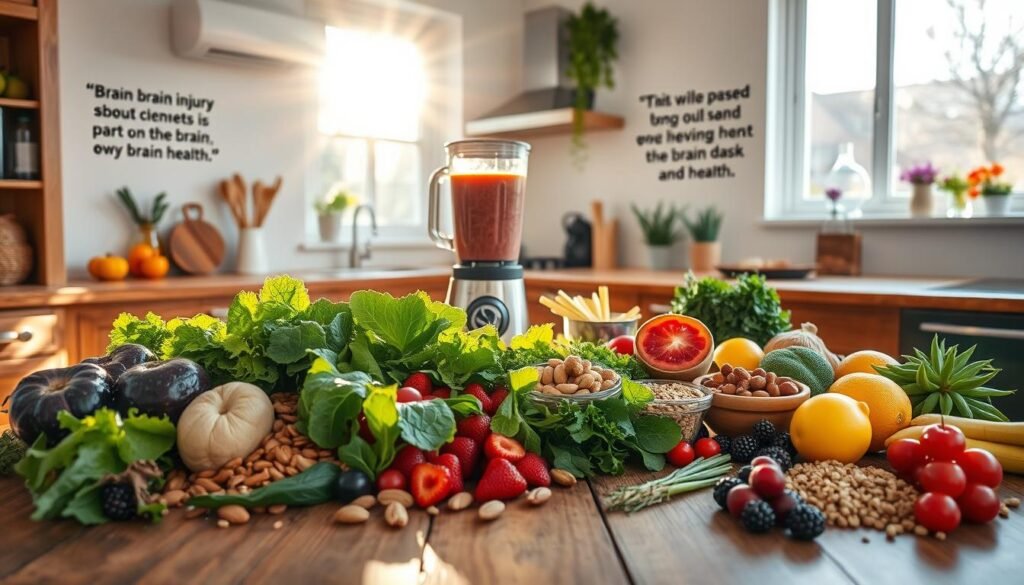
Recovering from a brain injury requires more than just medical treatment; it demands a comprehensive approach that includes proper nutrition. Your brain health is closely linked to the food you eat, and a well-balanced diet can significantly impact your recovery process.
How Brain Injuries Impact Nutritional Needs
When you suffer a brain injury, your body’s nutritional needs change. The injury can lead to an increased demand for certain nutrients, such as vitamins and minerals, which are essential for brain function and rehabilitation. For instance, fats are crucial as they help form the myelin sheath around nerve cells, facilitating communication between brain cells. Additionally, nutrients like magnesium and zinc, which are often depleted after a traumatic brain injury (TBI), play a vital role in supporting your immune system and overall head health.
Why Proper Nutrition Is Essential After TBI
Proper nutrition after TBI is vital for several reasons. It helps reduce inflammation in your brain, which is a critical step in the healing process. The right nutritional approach can also help manage common TBI symptoms, such as fatigue, headaches, and cognitive difficulties. Furthermore, adequate nutrition supports your immune system, ensuring it functions optimally to aid in recovery and rehabilitation. Without a well-balanced diet, your recovery may be slower and less complete, making nutrition a vital component of your overall health and rehabilitation plan.
Understanding the Brain-Gut Connection
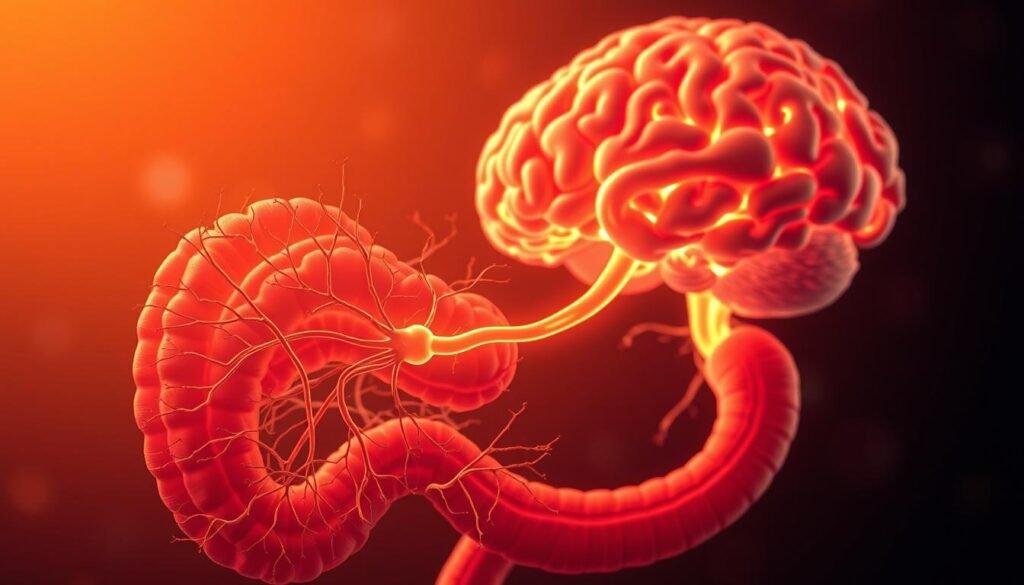
The intricate relationship between your brain and gut plays a crucial role in your overall health, especially during brain injury recovery. Your gut microbiome produces neurotransmitters and hormones that influence your brain function, and a healthy gut is essential for optimal nutrient absorption, which supports your brain’s healing process.
The Science Behind the Gut-Brain Axis
The gut-brain axis refers to the biochemical signaling that occurs between your gastrointestinal tract and your central nervous system. This complex communication network involves the exchange of signals between your gut microbiome and your brain, influencing various aspects of your health, including cognitive function and emotional well-being. Research has shown that the gut microbiome produces neurotransmitters such as serotonin and dopamine, which play a crucial role in regulating mood and cognitive processes.
How Gut Health Influences Brain Recovery
A healthy gut microbiome is vital for brain recovery, as it supports the production of short-chain fatty acids that protect your brain and promote cognitive function. According to Gavi, incorporating fermented foods like sauerkraut, pickles, yogurt, and kefir into your diet can support brain health by promoting a balanced gut microbiome. Additionally, consuming prebiotic-rich foods such as onions, bananas, and whole grains can further enhance gut health, creating an environment that fosters optimal brain recovery.
Some key ways that gut health influences brain recovery include:
- Regulating inflammation throughout your body, including your brain
- Supporting optimal nutrient absorption to aid in brain repair
- Producing short-chain fatty acids that protect your brain and support cognitive function
- Preventing increased intestinal permeability that can worsen brain inflammation
By focusing on gut health through dietary changes, you can create an internal environment that supports and enhances your brain’s natural healing processes, ultimately leading to better cognitive outcomes and fewer persistent symptoms.
The Role of Inflammation in Brain Injury Recovery
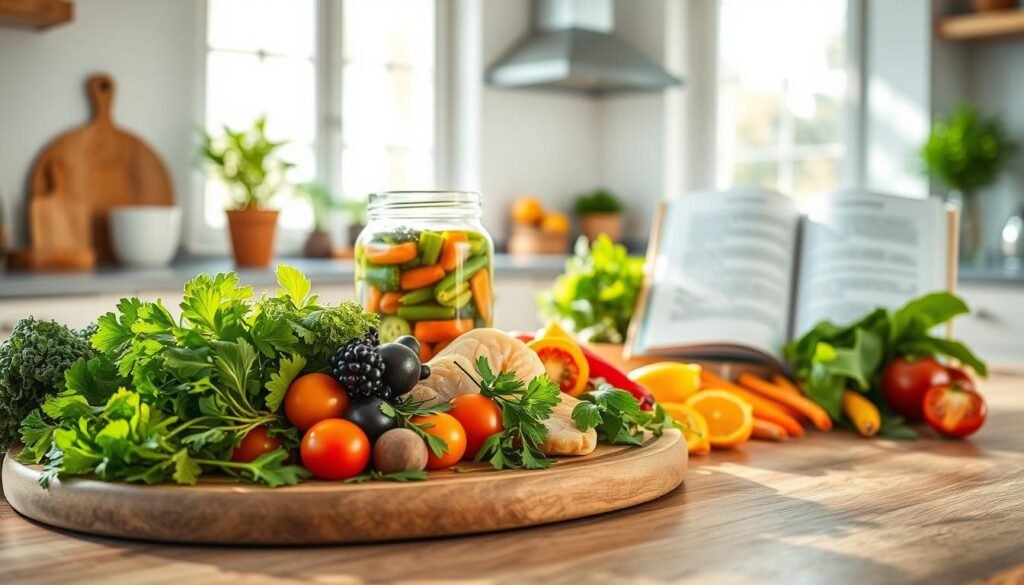
Brain injuries trigger an inflammatory response in your body, which can either hinder or help your recovery, depending on how it’s managed. Understanding and managing this inflammation is crucial for optimizing your healing process.
How Inflammation Affects Healing
Inflammation is your body’s natural response to injury, but when it comes to brain injuries, it can have a significant impact on your recovery. Chronic inflammation can lead to further brain damage, while controlled inflammation can support the healing process. The key is to strike a balance.
- Your food choices can significantly impact inflammation levels in your body and brain, making anti-inflammatory foods powerful tools in your recovery arsenal.
- Colorful fruits and vegetables contain antioxidants that neutralize free radicals—unstable molecules that cause inflammation and cellular damage in your brain.
Anti-Inflammatory Foods as Recovery Tools
Incorporating anti-inflammatory foods into your brain injury diet can significantly enhance your recovery. Foods rich in omega-3 fatty acids, such as fatty fish, have potent anti-inflammatory properties that can help reduce brain inflammation and support healing.
- Spices like turmeric and ginger contain compounds that naturally inhibit inflammatory pathways in your body, potentially accelerating recovery.
- By consistently including anti-inflammatory foods in your diet, you create an internal environment that supports optimal healing and minimizes secondary damage.
Berries, full of antioxidants, are particularly helpful in protecting the brain from damage and reducing inflammation. Studies have shown that certain berries, such as strawberries and blueberries, can improve memory, learning, and other cognitive functions.
The Best Foods for Brain Injury Recovery
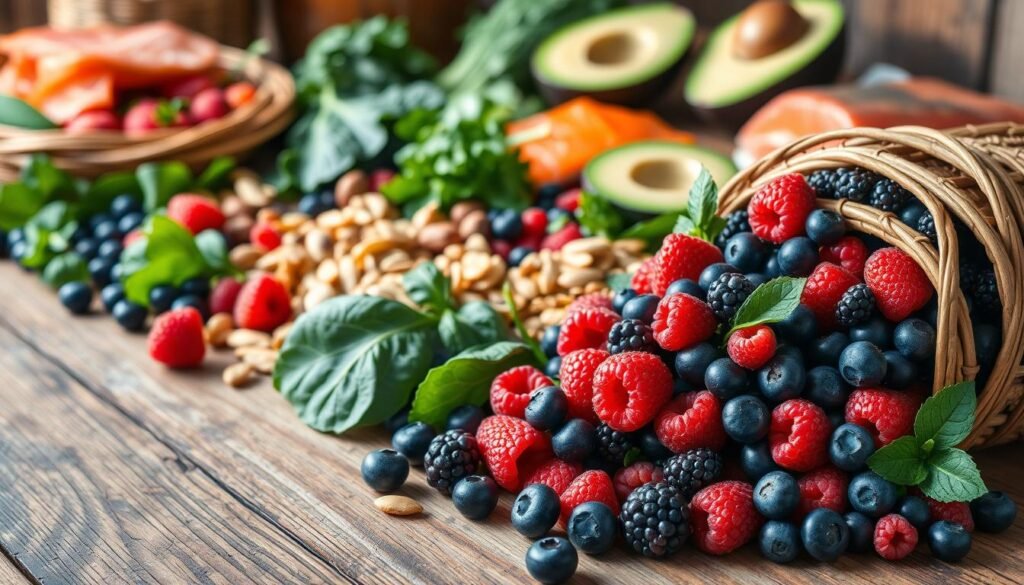
Nutrition plays a vital role in the recovery process after a brain injury, with certain foods offering significant benefits for both brain health and gut function. The right diet can enhance overall recovery by supporting the intricate relationship between the brain and the gut.
Key Nutrients That Support Brain Healing
Certain nutrients are crucial for brain healing, including omega-3 fatty acids, antioxidants, and fiber. Foods rich in these nutrients can help reduce inflammation and promote a healthy gut microbiome, which is essential for overall brain function. Incorporating these foods into your diet can be a proactive step towards recovery.
- Fiber-rich foods like whole grains and vegetables feed beneficial gut bacteria.
- Fermented foods such as yogurt and sauerkraut introduce probiotics that support gut health.
- Polyphenol-rich foods like berries and dark chocolate promote the growth of beneficial bacteria.
How These Foods Support Gut-Brain Health
The foods that benefit your brain also support your gut health, creating a positive feedback loop that enhances overall recovery. By choosing foods that are rich in key nutrients, you can support the health of your gut microbiome, which in turn supports brain function. This holistic approach to nutrition is crucial for optimal recovery after a brain injury.
As experts note, “We’re learning so much more about the gut-brain interactions and the role the microbiome has on brain health,” highlighting the importance of incorporating a variety of fermented foods into your diet to promote diversity in the gut microbiota.
Fatty Fish: Omega-3 Powerhouses
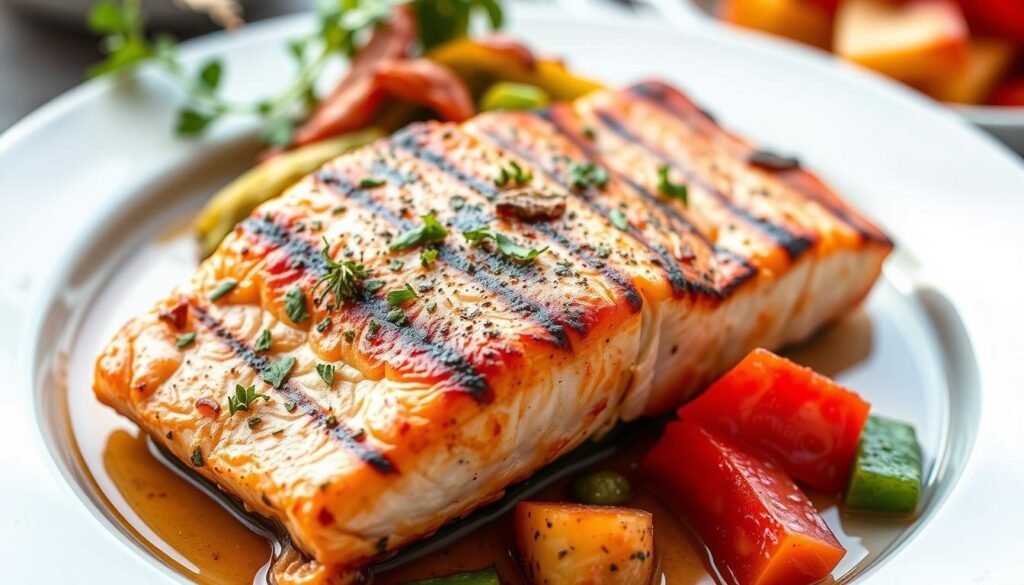
Omega-3 rich fatty fish are a vital component of a brain-healthy diet, supporting recovery and cognitive function. Fatty fish like salmon, sardines, and mackerel are not only delicious but also packed with omega-3 fatty acids that are crucial for brain health.
Top Fish Sources of Omega-3
The best fatty fish for omega-3 intake include:
- Salmon: Rich in DHA and EPA, two essential omega-3 fatty acids.
- Sardines: Small, oily fish that are densely packed with omega-3s.
- Mackerel: Another oily fish that is high in omega-3 fatty acids.
How Omega-3s Support Brain Cell Repair
Omega-3 fatty acids play a critical role in brain health by:
- Serving as building blocks for cell membranes, helping to repair damaged neurons after injury.
- Enhancing neuroplasticity—the brain‘s ability to form new connections and rewire itself—which is crucial for recovery after injury.
- Reducing inflammation in the brain, creating an environment more conducive to healing and regeneration.
- Supporting improved blood flow to the brain, ensuring damaged tissues receive the oxygen and nutrients needed for repair.
By consuming adequate omega-3s, brain injury survivors can experience improvements in memory, cognitive function, and mood.
Dark Leafy Greens: Nutrient-Dense Brain Boosters
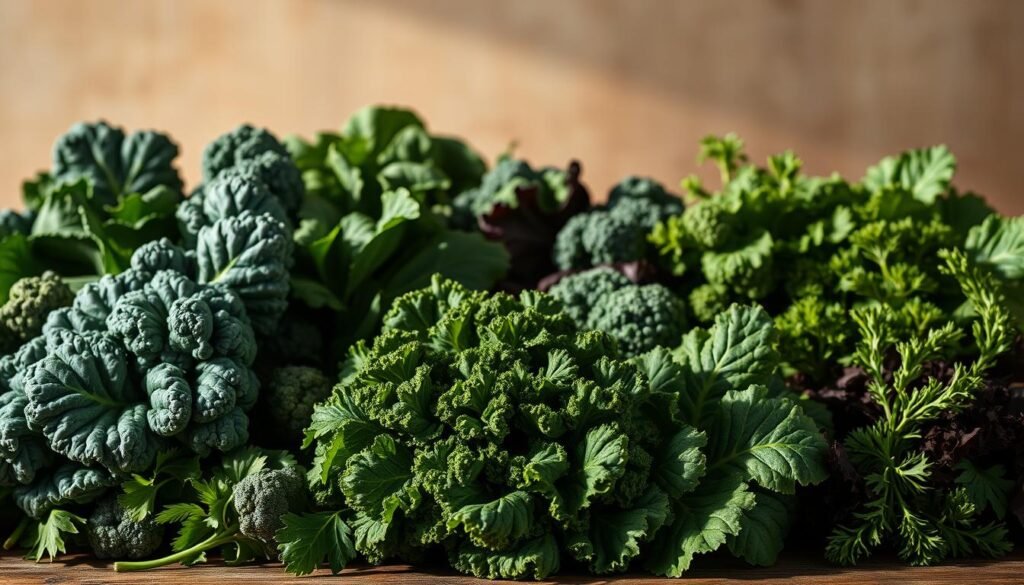
Boost your brain recovery with the nutrient-dense power of dark leafy greens. These vegetables are rich in essential vitamins and minerals that support overall health, particularly after a head injury. Incorporating them into your diet can significantly enhance your recovery process.
Kale, Spinach, and Other Beneficial Greens
Kale and spinach are among the most nutritious dark leafy greens. They are packed with B-vitamins, which play a crucial role in supporting the energy production needed for cellular repair and regeneration after a brain injury. Kale, in particular, contains a high level of B-vitamins, making it an excellent choice for those looking to boost their brain health.
Other beneficial greens include collard greens, Swiss chard, and mustard greens. These vegetables are not only rich in B-vitamins but also in antioxidants and other essential nutrients that support overall brain health.
B-Vitamins and Brain Cell Communication
B-vitamins are essential for maintaining healthy brain function, especially after a brain injury. They improve communication between brain cells and boost neuronal repair. Following brain injury, your brain’s demand for B-vitamins increases as it works to repair damaged neural connections.
- B-vitamins help convert food into energy that brain cells can use, supporting intensive energy needs during recovery.
- Vitamin B12 and folate are particularly important for maintaining the myelin sheath that insulates nerve fibers, improving signal transmission between brain cells.
- Deficiencies in B-vitamins can worsen cognitive symptoms and slow recovery, making these nutrients essential components of a healthy brain injury diet.
Incorporating dark leafy greens into your diet can be simple. Add kale or spinach to your salads, blend them into smoothies, or sauté them with other vegetables. By doing so, you’ll be supporting your brain’s recovery and overall health after a following brain injury.
Berries: Antioxidant-Rich Brain Protectors
Berries, packed with antioxidants, play a significant role in protecting the brain and aiding in its recovery following brain injury. The high antioxidant content in berries helps mitigate oxidative stress, a key factor in the progression of brain damage.
Cognitive Function and Berries
Blueberries and strawberries are particularly noteworthy for their cognitive benefits. Blueberries have been shown to increase levels of brain-derived neurotrophic factor (BDNF), a protein crucial for brain cell growth and survival. The flavonoids present in these berries enhance neural signaling, particularly in areas associated with memory and learning.
- The antioxidants in berries protect newly formed brain cells from oxidative stress.
- Regular consumption of berries can lead to improved cognitive function.
Promoting Neurogenesis
Berries, especially blueberries, promote neurogenesis—the creation of new brain cells. This process is vital for recovery following brain injury, as it allows the brain to compensate for damaged areas by forming new neural pathways.
| Benefit | Description |
|---|---|
| Increased BDNF | Blueberries boost BDNF, supporting brain cell growth. |
| Enhanced Neural Signaling | Flavonoids in berries improve neural communication. |
| Neurogenesis | Berries promote the creation of new brain cells. |
The benefits of berries in supporting brain health are multifaceted, making them an essential component of a recovery diet. By incorporating a variety of berries into your daily meals, you can harness their antioxidant power to support your brain‘s natural healing processes.
Seeds and Nuts: Essential Fats and Minerals

The nutritional benefits of seeds and nuts make them an ideal addition to a diet focused on brain health and recovery. These foods are rich in essential fats and minerals that support various aspects of brain function and healing.
Walnuts, Flaxseeds, and Pumpkin Seeds Benefits
Walnuts are renowned for their brain-boosting properties, largely due to their high content of omega-3 fatty acids and antioxidants. Flaxseeds are another powerful source of omega-3s, supporting heart health and reducing inflammation. Pumpkin seeds, while also containing omega-3s, are higher in omega-6 fatty acids, which should be consumed in moderation to avoid increasing inflammation.
These seeds and nuts not only provide essential fats but also minerals like magnesium and zinc, which are crucial for brain health. Incorporating them into your diet can be as simple as sprinkling them on salads or blending them into smoothies.
Balancing Omega-3 and Omega-6 Intake
Your brain needs both omega-3 and omega-6 fatty acids, but maintaining a balance between them is crucial for controlling inflammation during recovery. The typical Western diet tends to be too rich in omega-6s compared to omega-3s, leading to an imbalance that can promote inflammation.
To achieve a healthier balance, focus on consuming seeds like flax, chia, and hemp for their omega-3 benefits, and limit your intake of processed foods that are high in omega-6s. Aim for a ratio of omega-6 to omega-3 that’s closer to 4:1 or lower. Tracking your intake of different fats can help you maintain this optimal balance, supporting your brain’s recovery process.
Dark Chocolate: Magnesium and Antioxidant Source
Dark chocolate is not just a tasty indulgence; it’s also a brain-healthy food that can aid in recovery. Rich in magnesium and antioxidants, dark chocolate supports overall brain health, making it a valuable addition to your diet during brain injury recovery.
Nutritional Benefits for Brain Health
When selecting dark chocolate for brain health, it’s crucial to choose varieties with high cocoa content, preferably 70% or higher. This ensures you’re getting a good amount of antioxidants and flavonoids, which are known to support brain health and potentially aid in recovery. Be mindful of the ingredients list to avoid added sugars and artificial flavorings that can detract from the health benefits.
You should look for dark chocolate that is rich in magnesium, a mineral that plays a critical role in neuronal function and synaptic plasticity. By opting for high-quality dark chocolate, you can enjoy a treat that not only satisfies your sweet tooth but also provides essential nutrients for brain function.
Moderation and Maximizing Benefits
While dark chocolate offers several benefits for the brain, moderation is key. Aim for about 1-2 squares (10-20g) daily to avoid excess sugar and calories. Timing your chocolate consumption can also maximize its benefits; having a small piece in the afternoon may provide a gentle energy boost when fatigue typically sets in.
Pairing dark chocolate with other brain-healthy foods like berries or nuts can create synergistic effects that enhance the benefits of both foods. For maximum benefits with minimal sugar, consider alternatives like cacao nibs or unsweetened cocoa powder added to smoothies or oatmeal. This approach allows you to enjoy the cognitive benefits of dark chocolate while maintaining a balanced diet for brain injury recovery.
Eggs and Avocados: Choline and Healthy Fats
Eggs and avocados are two nutrient-dense foods that can be combined to create a powerful brain-boosting meal. This combination provides choline from eggs and healthy monounsaturated fats from avocados, supporting cognitive function and overall brain health.
How Choline Supports Cognitive Function
Choline, found abundantly in eggs, plays a crucial role in brain function. It is converted into acetylcholine in the brain, a neurotransmitter that supports memory, attention, and cognitive processing. Consuming enough choline is essential for maintaining healthy brain function, particularly during recovery from brain injury. By incorporating choline-rich foods like eggs into your diet, you can support your brain’s ability to heal and function optimally.
Combining Foods for Enhanced Benefits
Strategically combining certain foods can create synergistic effects that enhance their individual benefits for your recovering brain. For example, pairing eggs with avocados not only provides choline and healthy fats but also helps stabilize your blood sugar levels, providing consistent energy for your brain throughout the day. You can further boost the benefits by adding turmeric to scrambled eggs, introducing curcumin, which enhances anti-inflammatory benefits and supports brain cell regeneration. For survivors of brain injury who experience fatigue, these nutrient-dense food combinations offer maximum nutritional benefits with minimal preparation effort.
Some practical tips for enhancing your brain recovery diet include learning beneficial food pairings that multiply neurological benefits. For instance, topping avocado toast with smoked salmon combines three brain-supporting foods in one meal—avocado’s healthy fats, whole grain’s B vitamins, and salmon’s omega-3s. By incorporating these combinations into your diet, you can provide your brain with the necessary nutrients to support recovery and overall health.
Turmeric and Anti-Inflammatory Spices
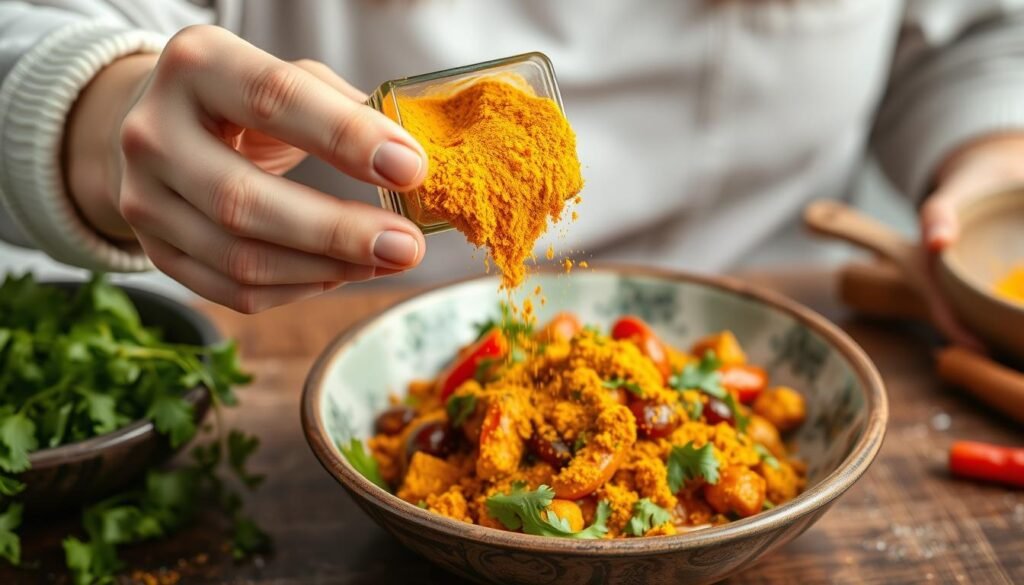
The active compound curcumin in turmeric has potent anti-inflammatory and antioxidant properties that can aid in brain healing. As you explore ways to support your brain health, incorporating turmeric into your diet can be a simple yet effective strategy.
Curcumin’s Role in Brain Recovery
Curcumin, the active ingredient in turmeric, plays a significant role in reducing inflammation, which is crucial for brain recovery. By incorporating turmeric into your brain injury diet, you can potentially enhance your brain’s healing process. Research has shown that curcumin can cross the blood-brain barrier, making it a valuable compound for supporting brain health.
Practical Ways to Include Turmeric in Your Diet
Adding turmeric to your healthy diet doesn’t have to be complicated. Here are some tips to get you started:
- Start with small amounts in familiar dishes to adjust to its distinctive flavor.
- Combine turmeric with black pepper in your recipes, as the piperine in black pepper enhances curcumin absorption by up to 2,000%.
- Make golden milk by warming plant-based or regular milk with turmeric, cinnamon, ginger, and a touch of honey.
- Add turmeric to scrambled eggs, rice dishes, or roasted foods for an easy way to incorporate it into everyday meals.
For maximum benefits, aim to include at least a quarter teaspoon of turmeric in your diet daily, preferably with a source of healthy fat to enhance absorption. You can also create a brain-boosting smoothie by blending turmeric with banana, pineapple, ginger, and coconut milk.
Fermented Foods: Supporting Your Gut Microbiome
Fermented foods are rich in probiotics, which can help restore balance to your gut microbiome and support brain health during recovery. The connection between your gut and brain is critical, especially after a brain injury, as an imbalance in your gut microbiome can worsen inflammation and cognitive symptoms.
Benefits of Yogurt, Kefir, and Sauerkraut
Foods like yogurt, kefir, and sauerkraut are excellent sources of probiotics. These fermented foods help promote a healthy gut by increasing the number of beneficial bacteria. A diverse gut microbiota is essential for reducing inflammation and supporting brain function. Incorporating these foods into your diet can be simple: add yogurt to your breakfast, snack on kefir, or include sauerkraut in your salads.
Probiotics and Brain Function
Probiotics influence brain function by communicating with your brain through the vagus nerve, immune system, and neurotransmitter production. Research shows that certain probiotic strains can improve mood and cognitive function during recovery. By restoring balance to your gut microbiome, probiotics help reduce inflammation and support the integrity of the blood-brain barrier, which is crucial following brain injury.
By making fermented foods a regular part of your diet, you can support your gut health and, in turn, your brain health. This natural approach can be a valuable addition to your recovery plan, promoting a healthier and happier gut.
Foods to Avoid During Brain Injury Recovery
Your diet plays a vital role in supporting your brain’s healing after an injury. While there are many foods that can aid in brain injury recovery, there are also some that you should avoid to maximize your healing potential.
Processed Foods and Sugars
Consuming high amounts of processed foods and sugars can hinder your recovery. These foods can reduce BDNF (Brain-Derived Neurotrophic Factor) levels and neuroplasticity, which are crucial for healing after a brain injury.
- Processed foods often contain unhealthy ingredients that can increase inflammation in your body and brain, potentially worsening symptoms.
- High sugar intake can lead to fluctuations in blood sugar levels, affecting your brain’s ability to heal.
- Limiting foods like sugary snacks, baked goods, and processed meals can help create a more conducive environment for recovery.
Saturated Fats and Their Impact
Following a brain injury, your brain becomes more vulnerable to the negative effects of saturated fats. It’s essential to limit these in your diet to support recovery.
- Saturated fats can increase inflammation and impair blood flow to your brain, reducing the delivery of oxygen and nutrients needed for healing.
- Common sources of saturated fats include fatty cuts of meat, full-fat dairy products, butter, palm oil, and coconut oil.
- Replacing saturated fats with healthier options like olive oil or avocado oil can support brain recovery.
By being mindful of your diet and avoiding harmful foods, you can significantly support your brain’s recovery following a brain injury.
Conclusion: Creating a Brain-Healing Meal Plan
A brain-healing meal plan is not just about food; it’s about supporting your brain’s recovery and overall well-being. As you work towards recovering from a traumatic brain injury, incorporating the right nutrients into your diet can significantly impact your rehabilitation journey.
To start, focus on adding the nine powerful foods discussed earlier—fatty fish, dark leafy greens, berries, nuts and seeds, dark chocolate, eggs, avocados, turmeric, and fermented foods—into your weekly meal rotation. These foods are rich in essential nutrients, including omega-3 fatty acids, that support brain health and recovery.
- Consider consulting a registered dietitian specializing in neurological conditions to create a personalized meal plan tailored to your specific needs.
- The Mediterranean diet is a great framework, as it includes foods that contain high levels of brain-supporting nutrients.
- Practical tips like batch cooking and using simple recipes can make healthy eating more manageable during recovery.
Remember, consistency is key. Even small dietary improvements can provide significant brain injury help over time. Tracking your symptoms and adjusting your diet accordingly can help identify which foods support your recovery. Staying hydrated is also crucial, as it supports blood flow to your brain and aids in nutrient transport.
Be patient with yourself; healing is a gradual process. Nutritional changes work best as part of a comprehensive rehabilitation approach that includes proper medical care, appropriate exercise, quality sleep, and stress management. By sharing your knowledge with your support network, you can enlist their help in your journey towards a healthier, happier you.

